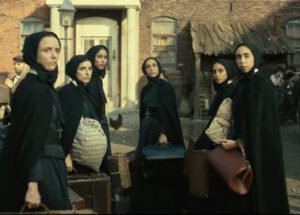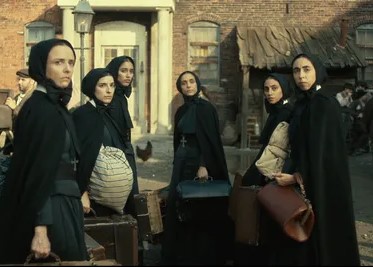Movie Info
Movie Info
- Director
- Alejandro Monteverde
- Run Time
- 2 hours and 22 minutes
- Rating
- PG-13
VP Content Ratings
- Violence
- 3/10
- Language
- 2/10
- Sex & Nudity
- 2/10
- Star Rating
Relevant Quotes
Then the king will say to those at his right hand, ‘Come, you who are blessed by my Father, inherit the kingdom prepared for you from the foundation of the world, for I was hungry and you gave me food, I was thirsty and you gave me something to drink, I was a stranger and you welcomed me, I was naked and you gave me clothing, I was sick and you took care of me, I was in prison and you visited me.
Religion that is pure and undefiled before God the Father is this: to care for orphans and widows in their distress and to keep oneself unstained by the world.
He said, “In a certain city there was a judge who neither feared God nor had respect for people. In that city there was a widow who kept coming to him and saying, ‘Grant me justice against my accuser.’ For a while he refused, but later he said to himself, ‘Though I have no fear of God and no respect for anyone, yet because this widow keeps bothering me, I will grant her justice, so that she may not wear me out by continually coming.’

With little fanfare this inspiring film opened in our theaters midway into Women’s History Month, but it is even more timely—and significant– for another reason. It is probably the best defense of immigrants that you will see in this or any year. Although the name Mother Cabrini is well known because she became the first American to be canonized a saint, her story is not. Therefore, director Alejandro Monteverde and his co-writer Rod Barr have performed a great service to our country at a time when immigrants are under attack, even criminalized by hate-filled politicians and their followers.
At the very beginning the filmmakers attack ethnic prejudice in the sad scene in a New York slum in which a boy’s cries for help are ignored as he pushes in a cart his ill mother along a crowded street He rushes into a hospital, obviously distressed, but the nurse ignores him because he speaks Italian. A policeman quickly thrusts him back onto the street. The woman dies and the police van carts her body off to Potter’s Field while the boy cries out, “Where are you taking her?” but no one answers him.
Switch to Italy where at the Vatican a cardinal is rejecting again the proposal of Sister Francesca Cabrini (Christiana Dell’Anna) to create a missionary order to help the poor and set up orphanages in China. The Cardinal tells her, “There has never been an independent order of missionary women!” Ready for such a put down, Mother Cabrini replies, “Mary Magdalen brought news of the Resurrection to the Apostles. If the Lord confided that mission to a woman, why should he not confide in us?!”
Ever since she was a little girl she had wanted to become a missionary and go to China. In a later flashback we will see her as a child while visiting her priest uncle who lived beside a canal where she is launching a series of folded-paper boats with a violet in each one. In her imagination the flowers are missionaries on their way to the Orient. Despite being afflicted by a lung disease she had aspired to become a nun, and though rejected by several orders she at last succeeds.
Cabrini, like the widow in Jesus’ parable, refuses to accept the cardinal’s “No.” She demands to see the Pope. Pope Leo XIII (Giancarlo Giannini) refuses to overrule the cardinal, telling her that no woman has been permitted to head such an order. She persists, eventually wearing him down, but he attaches an important condition. The impoverished Italians in New York need help, so he tells her, “Not to the East but to the West..”
She, and her half-dozen sisters, find in the Five Points region of Manhattan that her people do indeed need help, the local priest being very ineffective. With nowhere to go that first night in the city, she is forced to accept the hospitality in a brothel of Vittoria (Romana Maggiora Vergano), a sexworker, who warns her to bar the door. That night Vittoria’s pimp Geno bangs on the door, telling them they cannot stay another night.
The next day in an audience with the hostile Archbishop Michael Corrigan (David Morse) he orders her to return to Italy. Only her letter from the Pope stays his hand. He grudgingly allows her to set up an orphanage but assures her he cannot fund it—and that she must not appeal to non-Italians for aid. When two orphans, Enzo and Paolo (Liam Campora and Frederico Ielapi) try to steal her basket of bread, she invites them to dinner at the orphanage, thus beginning a fruitful relationship. She also gains an important ally in Dr. Murphy (Patrick “Patch” Darragh) when he treats her after she collapses from her lung condition. He tells her she has just two or three years to live. She has heard this before from doctors, so she responds that she figures on five. Out of admiration he starts working with her.

There are far more obstacles than just an unjust judge that Cabrini must overcome–Geno, wanting to regain control of Vittoria; city Mayor Gould (John Lithgow), an Irishman regarding Italians as a threat to his people’s recent rise to power; a city inspector citing her orphanage for code violations; the brutal police who enjoy beating up Italians; the death of one of her youthful supporters; a famous Italian opera singer who turns down her request for help;
In the midst of the above struggles Mother Cabrini does find an ally. He is New York Times reporter Theodore Calloway (Jeremy Bobb) whom she conducts on a tour of Five Points to overcome his disbelief in her description of conditions as so wretched that rats live better there than humans. It is a phrase that he will incorporate into his series of articles exposing the miserable conditions and praising the work of the nuns. Although the articles disturb the Mayor, the public is so moved that contributions pour in for her work.
But enough troubles still lie ahead that a less determined person would have quit in despair. She manages to get the means to build a hospital to replace one that had closed, only to see it burn down when arsonists torch it. She is ordered by the Archbishop (who himself had been called on the carpet by the irate Mayor) to return to Italy, During her brief stay in Rome, she solidifies the Pope’s help IF she show him she has the means to support her. ambitious plans for the new hospital. The Pontiff wonders about her faith and her ambition because of her globe-spanning plans. She assures him she wants to create “an empire of hope.” Hoping to secure a large loan from the Italian Senate, she is rebuffed by Senator Bodio (Fedricco Castelluccio), so she barges into a Senate session and makes an eloquent plea, reminding them that they will be judged by how they helped the poor.
Returning to New York where an Archbishop with a changed heart meets them at the pier, she will have at last a face-to-face confrontation with the Mayor. She her Times reporter as a threat if he does not cooperate with her and promises the support of her people in the coming elections if he will. They shake hands and share a glass of whiskey, the Mayor admiringly saying, “It’s too bad you’re not a man. You would’ve been an excellent man.” He’s so dense that he thinks he is complimenting her! She responds, “Oh no, mister mayor. Men could never do what we do.”
This subtheme of feminism runs throughout the film, early on the Roman cardinal pointing out that no woman had ever headed a missionary society. She wants to go overseas, but the same Cardinal says, “Stay where you belong”—which means in Italy in her obscure orphanage in Lombardy. During her sickly childhood, a doctor had declared that she stay in bed “where she belongs..” And the accusation ”This no place for a woman!” is shouted by one of the Senators in Rome when she breaks into their chamber..
Of course, the major theme of immigrants and the prejudice against them also involves “belonging,” the resident population declaring that the newcomers do not belong. Late in the film the Archbishop will recall his own Irish immigrant father and his struggle against similar prejudice.
At the end of the film a narrator explains how Mother Cabrini lived way beyond Dr.Murphy’s prediction, dying at the then advanced age of 67 after sending out nuns to found schools, hospitals and orphanages all over the world, including at last China—all of them, he asserts, headed by women. Thus her “empire of hope! In 1946, 29 years after her death, she was canonized, the first American citizen so honored. Huge crowds, in Rome and in America, celebrated the event.
They say it is more difficult to portray a good person than a villain. Given that, Christiana Dell’Anna does a marvelous job. There is no trace of a stained-glass tone when she speaks. Her dark eyes seem to bore into her adversary, refusing to look down in deference to any man trying to pull rank on her. She can be fierce when confronting the men, or warm and tender when assuring the self-loathing Vittoria that she is a person of worth.
The film’s estimated $50 million budget was well spent, with Five Points (an outcropping of Hell?) as well depicted in its soul-squashing squalor s it was in Martin Scorsese’s Gangs of New York. Cinematographer Gorka Gómez Andreu shoots everything as if were Rembrandt—especially effective in the rooms lit by candles. A brief shot of Cabrini meditating in a chapel looks like a Renaissance painting, with its mural-decorated walls and a column of light streaming through its large window.
The film is first class in every way, nor will I complain at the 2 hour and 22 minutes running time—for me there are no superfluous scenes. I do wish the companion sisters were given a little more to say, though maybe that goes counter to what I just wrote. Unlike in the film. Just one of them spoke English when they arrived in America, and it was not Mother Cabrini. Several other liberties are taken such as the fictional Mayor being a composite of city officials opposed to the nuns. There was no Vittoria, either, though I hope their made-up friendship was typical of Mother’s approach to the fallen.
As I wrote earlier, this historical (largely) film could not be more timely. The slurs of the day—“Dago,” an epithet I often heard my relatives use—are today replaced by “vermin” and “rapists,” but the same fear and hatred of would-be immigrants still warps the souls of some of our citizens. By all means support this tribute to the fearless woman who has come to be known as the Patron Saint of Immigrants.
This review will be in the April 2024 .issue of VP along with a set of questions for reflection and/or discussion. If you have found reviews on this site helpful, please consider purchasing a subscription or individual issue in The Store.

